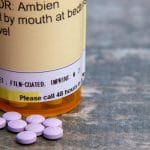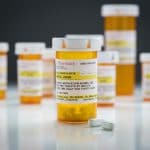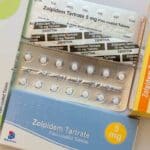Like with any drug, Ambien use can lead to an overdose if enough is taken. For Ambien, that can be as low as 70 mg.
Ambien, the brand name for zolpidem, is a non-benzodiazepine sedative-hypnotic prescription drug usually used for treating insomnia in the short-term.
How Much Ambien Is Too Much?
How much Ambien you take and how you take it can determine whether you experience an overdose or not.
The average dose of Ambien normally prescribed is between 5 and 10 mg and the dose should never exceed 10 mg.
Those who take more, either by accident or on purpose, increase their risk of an overdose. While 70 mg can be high enough to cause an overdose, the usual overdose level is between 400-600 mg. A lethal overdose can occur at approximately 2000 mg.
Ambien Abuse & Overdose Risk
How you take Ambien can also increase your risk of an overdose. If you snort it or dissolve it in water and give yourself an intravenous injection, you’re likely increasing your risk of overdose.
Taking the prescription medication this way allows it to bypass the digestive system. Instead of getting a little bit of the drug over time, you get the full dose immediately. This can lead to serious side effects.
Ambien Overdose
Ambien is considered a central nervous system depressant. This means it increases the activity of the neurotransmitter GABA in the brain. This increase causes brain activity to slow down.
With a normal dose of Ambien, the brain and central nervous system slow just enough to help with sleep.
During an overdose, the brain and body can slow down so much that your breathing becomes shallow, your heartbeat slows, and you may even go into a coma.
Ambien Overdose Symptoms
If you suspect someone is experiencing an Ambien/zolpidem overdose, there are some signs and symptoms you can look out for.
Common Ambien overdose symptoms include:
- drowsiness
- agitation
- hallucinations
- lightheadedness
- memory loss
- shallow or irregular breathing
- weak or irregular heart rate
- muscle aches
- tremors
- poor motor coordination
- coma
Taking illicit drugs with Ambien can also be problematic as you may not know the exact ingredients or the dose of what you’re taking. An overdose can come on quickly and you may be unaware of what caused it.
Ambien Overdose Risk Factors
There are several risk factors that may increase your risk of overdosing on Ambien. One of the biggest risk factors is a person’s age. People over 65 have the highest risk of overdose.
Other risk factors can include:
- gender: women are typically more sensitive to Ambien and more likely to take more than prescribed
- taking more than prescribed: anyone taking a higher dose than prescribed is at an increased risk for overdose
- polysubstance use: using ambient with other substances like alcohol, benzodiazepines like Xanax, and opioids increases your risk of an overdose
- history of substance use: anyone with a history of substance abuse is also at risk of an overdose
Treatment For Ambien Overdose
Calling 911 is the first step to take when someone experiences an overdose. After that, you’ll want to make sure the person’s airway is clear and put them on their side in case they vomit.
Once emergency help arrives, they’ll take the person to the hospital.
At the hospital, medical professionals may take a couple of different treatment routes:
- flumazenil: a healthcare provider may give flumazenil which works as an Ambien overdose antidote, counteracting the sedative effects of the drug and lowering toxicity
- stomach pumping (gastric lavage): if they think removing the drug from the stomach is a better option, they will likely pump the person’s stomach
- activated charcoal: they may also have the person drink activated charcoal because it can absorb some of the excess drug and ease overdose symptoms
Once you’re stable, going into Ambien addiction treatment is usually the next step. Addiction treatment can include a detox program and inpatient or outpatient treatment.
Ambien Addiction Treatment
For detox, you may be put on a taper-down schedule to ensure you can come off the medication without the unpleasant withdrawal symptoms like nausea, vomiting, and convulsions.
During inpatient or outpatient treatment, you’ll likely participate in therapy and learn skills for relapse prevention. Because Ambien is a sleep aid that helps with insomnia, you may also learn better sleeping habits.
Find Help Today
If you or a loved one are struggling with Ambien abuse, please contact the helpline at Northeast Addiction Treatment Center to learn about our outpatient treatment options.
Sources
Written by
Northeast Addition Editorial Team
©2024 Northeast Addition Center | All Rights Reserved
This page does not provide medical advice.




